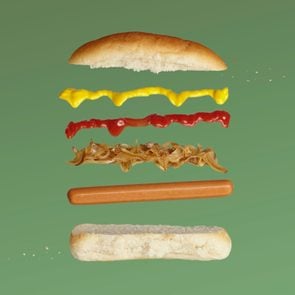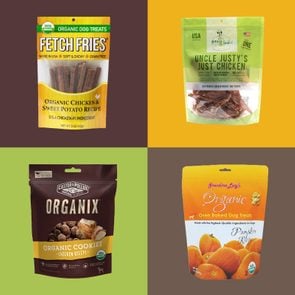Can Dogs Eat Hot Dogs? Here’s What Vets Say
Updated: Jul. 12, 2023

Can dogs eat hot dogs? Before you give Fido his own frank, learn if this cookout staple is actually a good treat for man's best friend
Summer is truly the season of grilling. Holidays like Memorial Day and the 4th of July provide excellent opportunities to fire up the charcoal, grab some hamburger and hot dog buns and cook up scrumptious burgers and hot dogs for the whole family. Someone in the pack who’s super excited to get their paws on a juicy hot dog? The family pup. They’ll stand idly by, patiently waiting for their chance to indulge in a meaty treat—or stare at you intently from your side, a classic dog behavior that’s code for, “Hey, give me some of your snack.” How can you resist those adorable eyes?! Before you cook up a redhot for your canine, though, ask yourself: Can dogs eat hot dogs? And is it a good treat to add to their diet?
We asked the experts if hot dogs are one of the human foods dogs can eat—and much like a delicious chili dog, the answered is layered.
Get Reader’s Digest’s Read Up newsletter for more pet, cleaning, travel, tech and fun facts all week long.
Can dogs eat hot dogs?
Technically, yes, dogs can eat hot dogs—but that doesn’t mean you should feed your pup a frank every day. “While they’re safe in the sense that they’re not toxic or poisonous to dogs, they’re not a healthy treat option,” explains David Littlejohn, DVM, a veterinary consultant who owned and operated a veterinary clinic for 26 years. He also says hot dogs are high in fat and sodium, and eating too much fat and sodium can lead to gastrointestinal upset, or even pancreatitis, in dogs. Linda Simon, MVB, MRCVS, a veterinary surgeon and veterinary consultant, adds that some hot dog additives (like coloring and preservatives) aren’t the best for your furry friend, either.
Hot dogs can also have a high calorie count, so feeding your dog too many can cause issues on the scale. “A single hot dog can contain about 100 to 150 calories,” Dr. Simon explains. “When you consider that an adult dog the size of a Chihuahua only needs about 225 to 250 calories a day, you can see how a small dog could soon become obese if they overdo it on the hot dogs.”
While dogs can eat a cooked hot dog, they shouldn’t be fed a raw hot dog. According to Canine Journal, there’s a lot of bacteria in raw hot dogs, so eating uncooked franks could make your dog sick.
Are certain types of hot dogs worse for dogs than others?
Dr. Littlejohn says that, yes, some types of hot dogs are worse for dogs than others. “Hot dogs that contain garlic or onions can be harmful to dogs, as these ingredients are toxic to them. Any hot dog that has additional seasoning or flavoring will be worse for your dog.” He advises that, if you do plan on feeding your pup a hot dog, look for franks made with natural ingredients and those that don’t contain preservatives or artificial flavors and colors. Also, ditch condiments like ketchup and mustard.
Megan McCarthy, DVM, a veterinarian at Best Friends Animal Society in Salt Lake City, also says to err on the side of caution when giving a dog a fatty hot dog or pork hot dog, as they can be too rich for some dogs’ stomachs. And if they are getting a cooked hot dog as a special treat, cut up the hot dog to reduce the chance of choking.
Which hot dogs can dogs eat?
Dr. McCarthy says lean chicken or turkey dogs may be a better, less fatty option for your dog. She also says very lean cooked meat, like boneless and skinless chicken breast, ground turkey and ground beef, can serve as alternatives since they’re less fatty and easier on a dog’s tummy. According to Dr. Littlejohn, chicken sausages can make great hot dog substitutes too. If you choose a meat treat for your dog, avoid feeding them meat that contains onion, garlic or other spices that could make them sick.
You can also ditch the meat altogether and opt for a food your dog will go nuts over: peanut butter. “You can simply put some peanut butter in an ice cube tray or a KONG and freeze it overnight—make sure the peanut butter is safe for dogs,” Dr. Littlejohn explains. “In the morning, pop out the peanut butter cubes or take the Kong out of the freezer and let your dog enjoy it on a warm summer day.” You can also give them certain fruits and veggies, like bananas and carrots. Or, give them a small amount of plain, air-popped popcorn or plain cooked eggs.
What should I do if my dog eats a hot dog?
Let’s be real: There are some dogs that will happily sneak a scrumptious hot dog off the picnic table while their humans aren’t looking. If your dog eats a hot dog, don’t panic. Dr. Littlejohn says that since hot dogs aren’t toxic to dogs, they should be fine—as long as your dog didn’t scarf down the whole pack. They may have an upset stomach and experience vomiting or diarrhea, but it should pass within 24 hours. Make sure they’re drinking water and keep an eye out for any notable behavior changes.
Dr. Littlejohn says veterinarians look at these key things when evaluating dogs that ate something they shouldn’t have:
- Amount of food consumed
- Dog size
- Ingredients of the food consumed
- Dog’s energy level
- Unusual changes in behaviors
- Physical discomfort or pain
- Eating and drinking habits since they ate the food
- Vomit and poop descriptions
- Gum color
So, can dogs eat hot dogs? The consensus is a cautious yes. Most dogs should be fine if they eat a hot dog, but hot dogs shouldn’t be a staple in their diet. And remember: If their behavior seems really off after eating one, play it safe and take your pup to the vet.
Next, learn if dogs can eat ice cream before you share a scoop with your fur baby.
Sources:
- David Littlejohn, DVM, veterinary consultant for Pawscessories.com
- Linda Simon, MVB, MRCVS, veterinary surgeon and veterinary consultant for FiveBarks
- Megan McCarthy, DVM, veterinarian at Best Friends Animal Society
- Canine Journal: “Can Dogs Eat Hot Dogs as a Meal or a Treat?”


